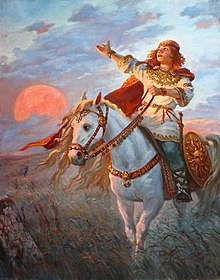Хърсъ
Appearance
Old East Slavic
[edit]
Alternative forms
[edit]Etymology
[edit]From Proto-Slavic *Xъrsъ.
Pronunciation
[edit]
- Hyphenation: Хъ‧рсъ
Proper noun
[edit]Хърсъ (Xŭrsŭ) n
- (Slavic mythology) Khors (Slavic god of the Moon)
- p. 1185, The Tale of Igor's Campaign, Aleksei Musin-Pushkin, published 1800:
- Вьсеславъ кънязь судяше, кънязьмь грады ⟨городы⟩ рядяше, а самъ въ ночь вълкъмь рискаше: ис Кыева дорискаше до куръ Тъмутороканя, великому Хърсови вълкъмь путь прѣрискаше ⟨пере-⟩.
- Vĭseslavŭ kŭnjazĭ sudjaše, kŭnjazĭmĭ grady ⟨gorody⟩ rjadjaše, a samŭ vŭ nočĭ vŭlkŭmĭ riskaše: is Kyjeva doriskaše do kurŭ Tŭmutorokanja, velikomu Xŭrsovi vŭlkŭmĭ putĭ prěriskaše ⟨pere-⟩.
- Prince Vseslav was a judge for his subjects, he distributed cities among princes, but by night he ran like a wolf, from Kiev he ran to Tmutorokan, before the cock crowed, as a wolf he ran along the road of the great Khors.
- a. 1200, Descent of the Virgin into Hell[1], quoted in Древніе Памятники Русскаго Письма и Языка, I. I. Sreznevsky, published 1863, page 205:
- то сетьнѣѥ и члв҃чьска імена та оутриꙗ Троꙗна Хърса Велеса Пероуна
- to setĭněje i člv:čĭska imena ta utrija Trojana Xŭrsa Velesa Peruna
- And having done that [they gave them] human names the next day - Troyan, Khors, Veles, Perun
- 1377, Dmitry of Suzdal, Laurentian Codex[2], page 48:
- и постави кумирꙑ на холму. внѣ двора теремнаго. перуна древѧна. а главу его сребрену. а оусъ ꙁлатъ. и хърса дажьб҃а. и стриб҃а. и симарьгла. и мокошь
- i postavi kumiry na xolmu. vně dvora teremnago. peruna drevęna. a glavu jego srebrenu. a usŭ zlatŭ. i xŭrsa dažĭb:a. i strib:a. i simarĭgla. i mokošĭ
- and he put idols on the hill, outside the palace, a wooden Perun and his silver head and a golden head. and Khors, Dazhbog and Stribog and Simargl and Mokosh
- → a male given name
Declension
[edit]Declension of Хърсъ (u-stem)
Descendants
[edit]Descendants
- → Belarusian: Хорс (Xors) (learned)
- → Bulgarian: Хърс (Hǎrs) (learned)
- → Czech: Chors (learned)
- → Kashubian: Chors (learned)
- → Macedonian: Хорс (Hors) (learned)
- → Polish: Chors (learned)
- → Russian: Хорс (Xors) (learned)
- → Serbo-Croatian: (learned)
- → Slovak: Chors (learned)
- → Slovene: Chors (learned)
- → Ukrainian: Хорс (Xors) (learned)
References
[edit]- Sreznevsky, Izmail I. (1912) “Хърсъ”, in Матеріалы для Словаря древне-русскаго языка по письменнымъ памятникамъ [Materials for the Dictionary of the Old East Slavic Language Based on Written Monuments][3] (in Russian), volume 3 (Р – Ꙗ и дополненія), Saint Petersburg: Department of Russian Language and Literature of the Imperial Academy of Sciences, column 1425
Categories:
- Old East Slavic terms inherited from Proto-Slavic
- Old East Slavic terms derived from Proto-Slavic
- Old East Slavic terms with IPA pronunciation
- Old East Slavic lemmas
- Old East Slavic proper nouns
- Old East Slavic neuter nouns
- orv:Slavic deities
- Old East Slavic terms with quotations
- Old East Slavic given names
- Old East Slavic male given names
- Old East Slavic u-stem nouns
